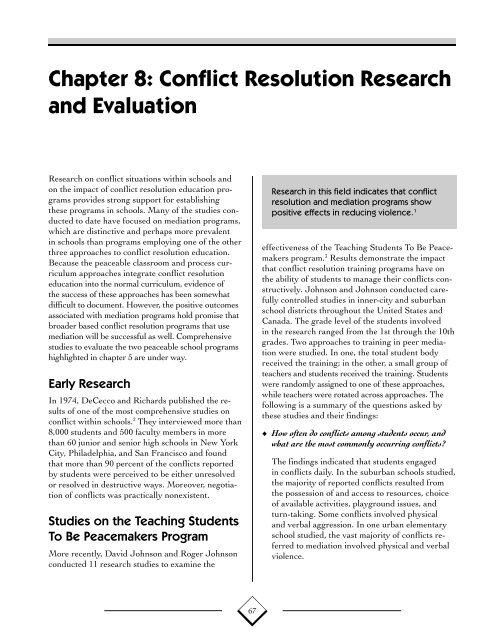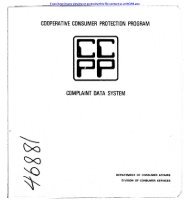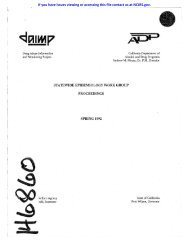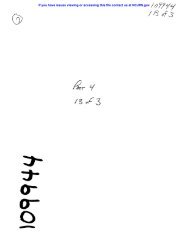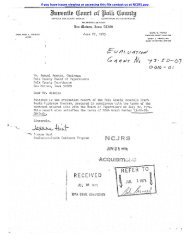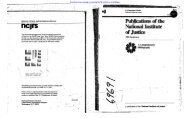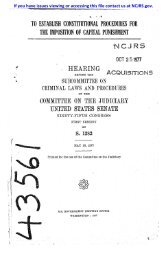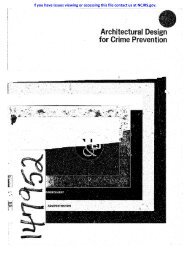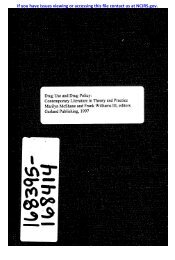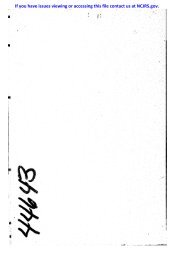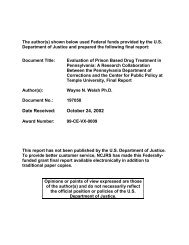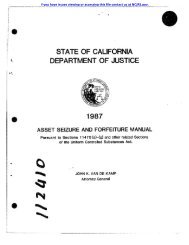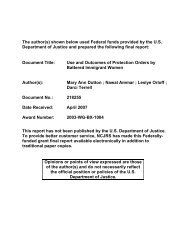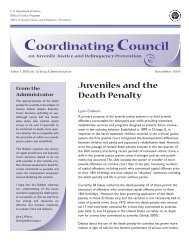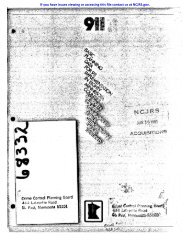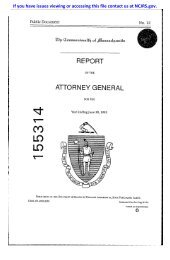Conflict Resolution Education - National Criminal Justice Reference ...
Conflict Resolution Education - National Criminal Justice Reference ...
Conflict Resolution Education - National Criminal Justice Reference ...
Create successful ePaper yourself
Turn your PDF publications into a flip-book with our unique Google optimized e-Paper software.
Chapter 8: <strong>Conflict</strong> <strong>Resolution</strong> Research<br />
and Evaluation<br />
Research on conflict situations within schools and<br />
on the impact of conflict resolution education programs<br />
provides strong support for establishing<br />
these programs in schools. Many of the studies conducted<br />
to date have focused on mediation programs,<br />
which are distinctive and perhaps more prevalent<br />
in schools than programs employing one of the other<br />
three approaches to conflict resolution education.<br />
Because the peaceable classroom and process curriculum<br />
approaches integrate conflict resolution<br />
education into the normal curriculum, evidence of<br />
the success of these approaches has been somewhat<br />
difficult to document. However, the positive outcomes<br />
associated with mediation programs hold promise that<br />
broader based conflict resolution programs that use<br />
mediation will be successful as well. Comprehensive<br />
studies to evaluate the two peaceable school programs<br />
highlighted in chapter 5 are under way.<br />
Early Research<br />
In 1974, DeCecco and Richards published the results<br />
of one of the most comprehensive studies on<br />
conflict within schools. 2 They interviewed more than<br />
8,000 students and 500 faculty members in more<br />
than 60 junior and senior high schools in New York<br />
City, Philadelphia, and San Francisco and found<br />
that more than 90 percent of the conflicts reported<br />
by students were perceived to be either unresolved<br />
or resolved in destructive ways. Moreover, negotiation<br />
of conflicts was practically nonexistent.<br />
Studies on the Teaching Students<br />
To Be Peacemakers Program<br />
More recently, David Johnson and Roger Johnson<br />
conducted 11 research studies to examine the<br />
67<br />
Research in this field indicates that conflict<br />
resolution and mediation programs show<br />
positive effects in reducing violence. 1<br />
effectiveness of the Teaching Students To Be Peacemakers<br />
program. 3 Results demonstrate the impact<br />
that conflict resolution training programs have on<br />
the ability of students to manage their conflicts constructively.<br />
Johnson and Johnson conducted carefully<br />
controlled studies in inner-city and suburban<br />
school districts throughout the United States and<br />
Canada. The grade level of the students involved<br />
in the research ranged from the 1st through the 10th<br />
grades. Two approaches to training in peer mediation<br />
were studied. In one, the total student body<br />
received the training; in the other, a small group of<br />
teachers and students received the training. Students<br />
were randomly assigned to one of these approaches,<br />
while teachers were rotated across approaches. The<br />
following is a summary of the questions asked by<br />
these studies and their findings:<br />
♦ How often do conflicts among students occur, and<br />
what are the most commonly occurring conflicts?<br />
The findings indicated that students engaged<br />
in conflicts daily. In the suburban schools studied,<br />
the majority of reported conflicts resulted from<br />
the possession of and access to resources, choice<br />
of available activities, playground issues, and<br />
turn-taking. Some conflicts involved physical<br />
and verbal aggression. In one urban elementary<br />
school studied, the vast majority of conflicts referred<br />
to mediation involved physical and verbal<br />
violence.


